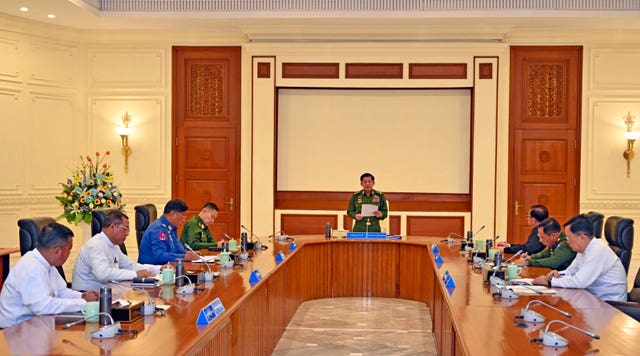
Ian Payne 4am - 7am
1 August 2024, 09:24

The state of emergency was initially declared when troops ousted the elected government of Aung San Suu Kyi on February 1 2021.
The military regime that seized power in Myanmar three and a half years ago extended a state of emergency in the civil war-wracked country for another six months, saying it needs time to prepare for long-promised elections.
The state of emergency was initially declared when troops ousted the elected government of Aung San Suu Kyi on February 1 2021, arresting her and members of her National League for Democracy party.
The emergency decree empowers the military to assume all government functions, giving the head of the ruling military council, Senior General Min Aung Hlaing, legislative, judicial and executive powers.
Currently, the military regime is facing its greatest challenge since taking power. Powerful ethnic minority militias and people’s defence forces that support Myanmar’s main opposition have taken wide swathes of territory in fierce fighting in recent months.

The military is now estimated to control less than half the country, but is holding on to much of central Myanmar, including the capital, Naypyidaw, which was recently targeted by small rocket attacks and two bombings.
The US criticised the state of emergency and called on the military regime to end the violence against Myanmar’s people and to allow humanitarian access into the country.
“The Burma military regime’s extension of the state of emergency is at odds with the aspirations of the people of Burma, including their continued strong opposition to military rule,” US State Department spokesperson Matthew Miller said, using Myanmar’s former name.
“We call on the regime to engage with all stakeholders to pursue a path toward a peaceful, representative, and democratic future.”
The statement issued on Wednesday said the Myanmar military’s actions have only prolonged the crisis that has displaced more than three million people within the country and sent thousands more seeking protection in neighbouring countries.
The extension of the state of emergency was granted by the National Defence and Security Council, after Ming Aung Hlaing argued more time was needed to restore stability to the country and carry out a census in preparations for national elections, state-run MRTV reported.
The plan for a general election is widely seen as an attempt to normalise the military’s seizure of power through the ballot box and to deliver a result that ensures the generals retain control.
Critics have already said the military-planned elections will be neither free nor fair because there is no free media and most of the leaders of Ms Suu Kyi’s National League for Democracy party have been arrested.
Under the country’s 2008 constitution, drafted by the army, the military can rule the country under a state of emergency for one year, followed by two possible six-month extensions before holding elections.
Wednesday’s extension, however, was the regime’s sixth, and was again rubber-stamped by the NDSC, which is nominally a constitutional administrative government body, but in practice is controlled by the military. It did not announce the details behind its decision.
Additionally, such extensions are supposed to be endorsed by the country’s president, but on July 22, acting President Myint Swe authorised Min Aung Hlaing to carry out the presidential duties with the NDSC while he is on medical leave.
The military originally announced elections would be held in August 2023, but has regularly pushed back the date and has recently said they would take place some time in 2025.
Under the country’s constitution, for an election to be held the military has to transfer government functions to the president at least six months before the polls.
The 2021 military takeover was met with widespread non-violent protests. But after peaceful demonstrations were put down with lethal force, many opponents of military rule took up arms, and large parts of the country are now embroiled in conflict.
The fiercest fighting recently has been in the north east, where the ethnic militias from an alliance group claimed last week to have seized Lashio, which houses the major regional military headquarters, and Mogok, the centre of the country’s lucrative gem-mining industry.
Reports suggest that regime troops continue to hold the regional headquarters but could be forced from Lashio soon.
In Lashio, the main prison gate was reportedly opened over the weekend and more than 200 political prisoners, including Tun Tun Hein, a former deputy speaker of the lower house of Myanmar’s parliament and senior member of Suu Kyi’s National League for Democracy party, were released.
Maung Maung Swe, a member of Myanmar’s main opposition group, the National Unity Government — whose leadership operates largely from outside the country — told The Associated Press that its forces in Myanmar were providing care for the released political prisoners.